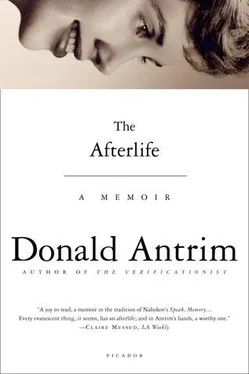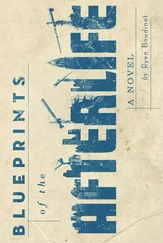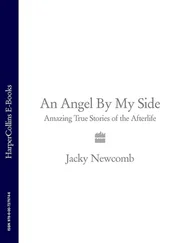According to my grandfather, one of the students who came to Tusculum under the widow’s scholarship had been born into a feud. O., a Kentucky boy, arrived at the college wearing a sidearm beneath his coat. O.’s father had killed a man and gone into hiding — not so much from the law as from the victim’s kin — and O. had vowed, in the event his father was killed by the man’s relatives, to avenge the death. For this reason, O.’s revolver never left his side. Did O. carry the gun to class? I might ask my grandfather, interrupting the narrative. Did he hide it in his pants at a Saturday-night dance? Did he keep it loaded beside the books on his desk? My grandfather thought he might have done these things. O. was ready at a moment’s notice to abandon school and hunt for revenge.
Until that time, he studied literature. It was customary in those days, the story went, for Tusculum students to produce a play at commencement, and in his senior year O. was encouraged by his teachers to write the play. My grandfather claimed to have seen the production, and described the work as a loving portrayal of O.’s family, and as an unromantic though somewhat comical depiction of backwoods poverty, stern religion, and alcoholism. It was, I suppose — and if I correctly understood my grandfather’s remarks about it — a work of American naturalism, possibly an accidental work of naturalism, and, I suspect, in keeping with styles taking hold on the American stage during the years between the world wars. This style could be seen in the works of Eugene O’Neill and others who had studied under George Pierce Baker, whose drama seminars at Harvard placed the literature of the theater in an active and responsive rather than a purely academic and literary context. Great plays are authentic, living stories of a civilization, and, in Baker’s view, the plays then being written for the American stage required, in order that our society could find itself mirrored in its contemporary theater, a milieu in which practical training in professional stagecraft might bring into existence a class of artists able to conceive and perfect what amounted to a new American art form. Baker’s famous classes became a foundation for the Yale School of Drama, founded in 1925. According to my grandfather, the commencement speaker for O.’s graduating class at Tusculum was a colleague of Baker’s who had gone to teach at the Drama School in New Haven. At the performance of O.’s play, which received rousing applause when the curtain came down, this guest speaker, startled to his feet by O.’s unexpected talent, promised him, before God and the Tusculum community, a place at Yale.
“What happened?” I sometimes asked my grandfather at this point in the story. It was our call and response.
He chewed his toothpick. “If I have it right, he went up to New Haven, and was there a year or two. I believe he might even have had a play produced in New York.”
“Did he carry his pistol?”
“Yes, he must have. He wanted to be ready to get up and go if he needed. He didn’t want to stop and so much as pack his bags. He wanted to catch the first train home. Well, one day he got word that his father had been shot. It was what he’d been waiting for. He folded the telegram and put it in his pocket and walked to the station and was never seen at Yale again.”
“He went to the mountains.”
“Yes. For years he tracked his father’s killer, but he never found the man.”
“Never.”
“Some years ago I was in Kentucky, Don, and I looked him up. He told me that after leaving Yale he dedicated himself to finding the killer. But eventually he realized that he simply would not find him. There was too much territory to cover. Don, you can walk twenty feet into those woods and lose your sense of direction and never come out. So he gave up. He became a teacher. By the time I found him, he was long retired.”
“Did he keep writing?”
“That’s a good question. I don’t know. I don’t believe he did, Don. I don’t think he did. Too much time had passed.”
But getting to the story at hand:
In 1994, my grandparents, too old to maintain their house, moved into a nearby assisted-living community, where they occupied a small apartment with a tiny yard planted with flowers. Several times I visited them there — an insomniac man in his mid-thirties, walking the long corridors of a rural home for the aged. I remember from those trips that the men and women of the place, who seemed ancient to me when I first arrived, began, as the days passed, to appear younger and more beautiful. The women in particular, in their laughter and their smiles, and in the way they might quickly glance away when aware of being looked at, showed evidence of themselves in their youth. I felt charmed by the ladies in my grandparents’ circle, and learned to understand that a woman near the end of her life has not given up her powers of seduction. While stopping after lunch to say hello, I might look into the eyes of a great-grandmother from Richmond or Atlanta and see, or imagine seeing, the girl who did not yet realize that everything and everyone ahead of her — the husband who would pass away, her children, and their children, since moved to distant cities — could come and go so quickly.
One afternoon in 1995, while I was talking to my grandfather about things that had happened before I was born, I saw a startled look pass across his face, as if he had seen something unexpected, and, in that instant, I was sure he’d felt the speed of time. A month later, on an October night, he walked into the bathroom, had a heart attack, and fell to the floor. He was ninety. Four years later, in the late summer of 1999, my grandmother followed him in her sleep. And two weeks after that, my mother, who had moved to North Carolina in the year following her father’s death, collapsed and was taken in an ambulance to an Asheville hospital.
It was not a surprise. At her mother’s funeral, her face looked worn and gray, the color of damp ash, and she was feverish and trembling. She could barely stand. When had my mother become such an old woman? Her cough had grown nightmarish, frightening to listen to. At her mother’s service, listening to her, it was possible to feel the worry and discomfort of the people sitting in the pews behind us, our grandmother’s elderly friends from church and town, and the small handful of relatives who’d driven in a single car across the mountains from eastern Tennessee, my mother’s uncle Orbin and her cousin Annette and aunt Dorothy. After the service, my mother found her way outside the church, where her cough abated long enough for her to light a cigarette and send herself into another fit.
That night, my sister and I stood on the porch at our hotel, and I told her that I thought our mother was a dangerous person. I said that I did not want to be alone with our mother. I said that I did not think our mother would live much longer. “A year? Two years?” I guessed. Then I suggested that Terry and I get ready for bad news ahead, because when the time came it would be up to us alone to handle our dying mom, who, during much of our childhoods, had been a drunk, a woman we had known — and, I think, in our memories, in our consciousnesses of ourselves, and in our bodies, continue to know — as a holy terror.
I remember my phone conversation with my mother, just over a week after my grandmother’s funeral. It was the morning after she’d been rushed to the Asheville hospital. I was back in Brooklyn. I sat perched on a low ottoman — slumped over, as if hiding in my own house. I pressed the telephone receiver against my ear, and my mother whispered that she was ready to die, and that she knew peace awaited her in the Universe. She told me she loved me, and would continue loving me when she was dead.
Читать дальше












